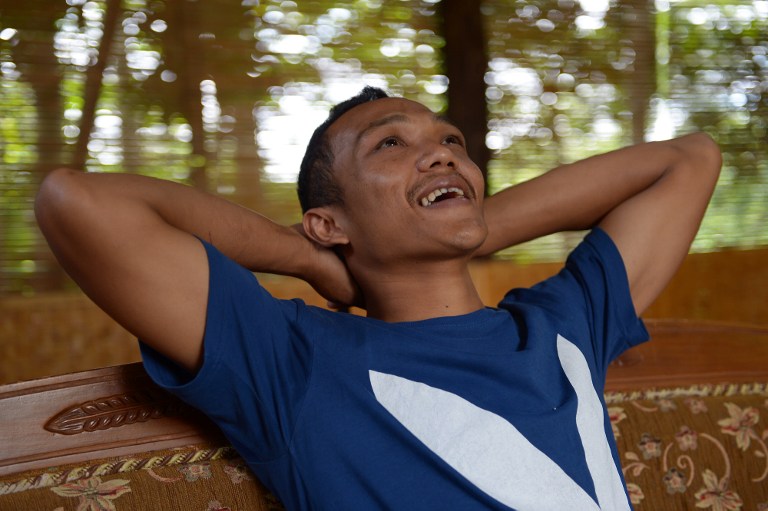Boxing offers Indonesian drug users way out of addiction

This picture taken on April 14, 2016 shows Indonesian boxer Jundullah Muhammad Fauzan gesturing during an interview with AFP in Bandung. AFP
Indonesia’s national featherweight champion Jundullah Muhammad Fauzan is clear eyed and focused when squaring off against opponents, but it’s outside the ring this young athlete fights his toughest battle.
For nearly a decade Fauzan was hooked on crystal methamphetamine, and kicking the habit hasn’t been easy.
But the 29-year-old keeps his demons at bay training alongside fellow addicts at a grassroots gym in Bandung, where boxing is blended with rehab in a unique program.
“Staying clean is a hard journey,” Fauzan told AFP in Bandung, a mountain-fringed city on Indonesia’s main island of Java.
“I don’t want to have too many expectations, but boxing has definitely helped my life.”
He’s not the only one. The simple gym where he trains — kitted out with punching bags, sparring gloves and couches for downtime — has provided a rare safe haven for countless drug users in a country where addiction often leads to jail time or premature death.
Indonesia has some of the toughest narcotics laws in the world. Users can be jailed for possessing even the smallest quantities of common recreational drugs like marijuana, while 14 traffickers were executed in 2015.
The hardline approach has been justified by President Joko Widodo, who claims Indonesia is facing a “drug crisis”.
The Indonesian Narcotics Agency estimated in 2015 there were 4.2 million drug users across the sprawling archipelago of about 255 million. The highest number were concentrated in West Java province, where Bandung is the capital.
A dearth of rehabilitation services in Bandung prompted five recovered addicts to open Pine House, an initiative aimed at empowering drug users and people living with HIV/AIDS through a mix of sports and counselling.
Ginan Koesmayadi, one of the founders, said they started with soccer clinics but in 2013 expanded to boxing, where they struck on a winning formula.
Lifting spirits
Recruiting experienced coaches and kitting out a simple, outdoor gym in downtown Bandung with punching bags and skipping ropes, Pine House soon attracted a dedicated band of boxing enthusiasts.
In between jump-rope sessions, hook classes and sparring, the amateur boxers meet with counselors to discuss their medical issues and progress overcoming their addictions.
Eva Dewi Rahmadiani trains several times a week at the gym and enjoys feeling strong again after years of illness from addiction and HIV.
The sessions were brutal at first, she said. But over time the urge for drugs faded, and she felt a new vitality despite the draining effect of antiretrovirals on her system.
“It just makes me happier. It elevates my spirit and reminds me that life isn’t over,” the young mother of three told AFP between workouts.
Koesmayadi said users were relieved simply to find a place free of prejudice — a rarity in Indonesia where addicts report harassment by police and exile from their communities.
“The stigma drives drug users deeper into despair, and their health ultimately worsens,” he said.
Activists largely disagree with the government’s approach to tackling drugs, saying it extends largely to religious intervention or law enforcement with little emphasis on rehabilitation.
A spokesman for the government’s narcotics agency admitted the country lacked extensive facilities for treating addiction, but denied the focus was exclusively on punishing users.
“The government has been trying recently to strike a balance between rehabilitation and law enforcement, but perhaps it can seem like we only care about prosecutions,” Slamet Pribadi told AFP.
Courage to dream
From chronic meth addict to national boxing champ, Fauzan is the undisputed poster boy from this humble gym.
But there are others following in his footsteps, seeking out a new life away from drugs, despair and constant threat of incarceration.
Resnu Sundava was drinking at 10, doing drugs by his teens and getting into fights on a regular basis. By the time he dropped out of high school, his addiction had spiralled out of control and friends and family had abandoned him.
But he’s improved remarkably since joining the gym in 2015 and seeing counsellors on a regular basis. The 22-year-old recently turned professional, and has competed in tournaments in Indonesia and neighbouring East Timor.
Sundava told AFP: “Now I have the courage to dream again. I want to be a world champion.”